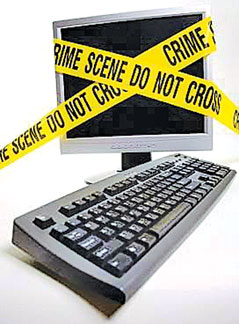Computer crime and criminal procedure
Sunil D B Abeyratne
Any person who obtains unauthorized access to a computer or network
(Computer hacking and cracking), modification of a computer or network
unlawfully, offences committed against national security, dealing with
data unlawfully obtained illegal interception of data, using of illegal
device, unauthorized disclosure of information enabling access to a
service are the offences defined under sections 3 to 10 of the Act
respectively.
 |
|
Sunil D B
Abeyratne |
Attempts to commit, abetment and conspiring to commit aforesaid
offences are also offences under sections 11, 12 and 13 of the Act
(earlier these offences were discussed in detail).
Procedural provisions
Part two of the Computer Crime Act provides provisions for
investigations in connection with offences under the same Act. These
procedural provisions are important to accelerate investigations due to
nature of computer evidence and all offences are cognizable offences
under this Act (s.16) and shall be investigated, tried or otherwise
dealt according to the provisions of the Code of Criminal Procedure Act
No. 19 of 1979 unless as otherwise provided under Computer Crime Act
(s.15).
The Minister may make regulations under this Act for any matter that
is authorized or required to be made under this Act or required to be
prescribed under this Act, for the purpose of carrying out or giving
effect to the principles and provisions of the same Act.
Who are the investigators under Computer Crime Act?
A panel of experts will be appointed by the Minister-in-charge of the
subject of Science and Technology. qualifications, experience and
remuneration of such experts are explained in the section 17 of the Act.
Bowers of investigators
The Act specifically states that such experts called upon to assist
any police officer shall have power to enter any premises along with a
police officer not below the rank of a sub-inspector, access any
information system, computer or computer system or any program, data or
information held in such computer to perform any function or to do any
such other thing, require any person to disclose any traffic data, oral
examination of any person, do such other things as may be reasonably
required for the purpose of the same Act.
For the purpose of an investigation under this Act, an expert or a
police officer may have powers to search and seizure of any information
including subscriber information and traffic data in the possession of
any service provider, intercept any wire or electronic communication
including subscriber information and traffic data, at any stage of such
communication with warrant (s.18).
Further, if preservation of information reasonably required for the
purposes of investigations (s.19), expert or Police officer has powers
to arrest, search and seize any information accessible within any
premises without a warrant in the course of investigation (s.21).
Legal position of reports prepared by investigators
Section 26 of the Act specifies that a certificate, declaration,
information, data, report or any other similar document duly signed and
issued by an expert under the Act or a Police officer and duly
authenticated by such expert of the panel in the prescribed manner shall
be admissible in evidence and prima facie evidence of the facts stated
therein.
 What are the orders that can be issued against person in control of
computer or computer system to ensure that the information be preserved
for the purpose of investigation of offences under Computer Crime Act? What are the orders that can be issued against person in control of
computer or computer system to ensure that the information be preserved
for the purpose of investigation of offences under Computer Crime Act?
When an expert or a Police officer is satisfied that the information
is reasonably required for the purpose of an investigation under this
Act and there is a risk that the information may be lost, destroyed,
modified or rendered inaccessible, he can issue a written notice to the
person in control of such computer or computer system to ensure that the
information be preserved for such period in accordance with such notice
not exceeding seven days.
Further, a Magistrate can extend such period in aggregate not more
than 90 days on an application made by such expert or Police officer
(s.19).
Duties of investigators
It is the duty of the Police officer to record and afford access to
seize data to the owner or Person-in-charge of the computer or computer
system (s.22) and to assist for investigation (s.23) etc. Section 24 of
the Computer Crime Act provides provisions for maintenance of
confidentiality of information obtained in the course of an
investigation.
Rights of investigators
Section 28 provides immunity from legal proceedings against experts
(who are peace officers under the section 29 of the Act) and Police
officers appointed for investigations under the Act.
Provisions to maintain international cooperation
There is no doubt that international Cooperation will play a vital
role for investigating and recovery of evidence under this Act since
computer programs online messages and cross territories of the countries
very often. To fulfil this requirement some provisions have been
inserted to the Computer Crime Act.
Section 33 of the Act provides where a request is made to the
Government of Sri Lanka, by or on behalf on another Government for the
purpose of extradition of the person accused or convicted of an offence
under this Act the Minister shall forthwith notify the requesting
Government of the measures which the Government of Sri Lanka has taken,
or proposed to take to extradite the person for that offence. Rights of
non-resident persons arrested under this Act specified under Section 34
of the Act.
Under section 35 of the Computer Crime Act the provisions of the
Mutual Assistance in Criminal Matters Act No. 25 of 2002 are applicable
for the investigation and prosecution of the offences under the Computer
Crime Act.
Provisions under the Mutual Assistance in Criminal Matters Act
explain that the procedure shall be followed to make a request from the
authority of a foreign State by Sri Lankan Authority and vice versa to
transfer of evidence, thing, witnesses and accused and the procedure
after complying with such request.
Other computer related offences
Publication of an obscene article electronically may be a criminal
offence under amended section 2 of the Obscene Publication Ordinance,
No. 22 of 1983.
Section 286B of the Penal Code (Amendment Act No. 16 of 2006)
introduced the offence as it is a duty of person providing service by
computer to prevent sexual abuse of a child and person who contravenes
the same shall be guilty of an offence.
Further, storing or distribution of child phonography by e-mail and
the Internet may be an offence under section 286(c) of the Penal Code
(Amendment) No. 22 of 1995 read with provisions under Electronic
Transactions Act No. 19 of 2006.
However, it is time to bring new amendments to the same law avoiding
certain unnecessary disputes that arise over interpretation of creation
of pseudo-photographs under this Ordinance.
Under Intellectual Property Act
 Chapter XXXVIII of the Intellectual Property Act No.36 of 2003
defines the Offences and Penalties against violation of Intellectual
Property Rights and these provisions are applicable for Intellectual
Property Rights violations in cyber space as well. Chapter XXXVIII of the Intellectual Property Act No.36 of 2003
defines the Offences and Penalties against violation of Intellectual
Property Rights and these provisions are applicable for Intellectual
Property Rights violations in cyber space as well.
Offences under Sri Lanka Telecommunications Act No. 25 of 1991
'Intrusion', 'interception and disclosure of contents of message' by
telecommunication officials, other than in the course of his duty are
offences under sections 52-54 of the Act.
"Usage information" means information relating to the identity of
calling subscriber, called subscriber, date and time of originating of
message and the type of message for the purpose of sections 52 and 54.
Provisions under Code of Criminal Procedure Act No. 19 of 1979 are
applicable for investigations of these offences.
Offences under Payment Devices Frauds Act
The Act was introduced to deal with fraudulent transactions taken
place in connection with electronic devices and similar provisions
relating to Computer Crime Act on procedural matters can be found under
the present Act as well.
Offences under this Act are cognizable offences. Section 12 explains
on Confidentiality of information obtained in the course of an
investigation.
|



